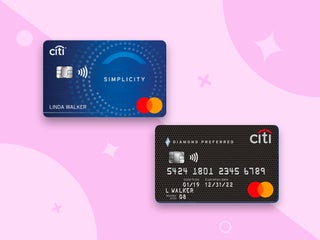Summary
Visa and Mastercard don’t issue cards themselves, so the best way to go is to find the issuer that offers the best perks for your lifestyle.
The content on this page is accurate as of the posting date; however, some of our partner offers may have expired. Please review our list of best credit cards, or use our CardMatch™ tool to find cards matched to your needs.
Visa and Mastercard are two of the largest credit card networks in the world, each operating in more than 200 countries. As card networks, Visa and Mastercard work with banks and financial institutions to process debit and credit card payments, but they don’t issue any cards themselves.
The benefits cardholders care about the most, like rewards, rates and fees, aren’t dependent on whether you’re using a Visa or Mastercard. Most of those benefits are provided by the card issuers themselves, such as Chase, Capital One, Citi and others.
If you’re comparing credit card offers, don’t worry too much about going with Visa versus Mastercard. Instead, focus primarily on the features that matter most to you.
What are the major differences between Visa and Mastercard?
Visa and Mastercard are similar in most respects, with one notable distinction. Since Visa and Mastercard are proprietary networks, you can’t use your Visa card to purchase goods or services from merchants who only accept Mastercard – and vice versa.
For example, Costco only accepts Visa cards, so you can’t use a Mastercard there. But Costco is an exception, because typically you can use a Visa or Mastercard nearly everywhere that accepts credit card payments.
Since Visa and Mastercard don’t actually issue credit cards, the most significant differences between them will come from the credit issuers themselves. Keep in mind, not every card issuer will carry the card networks benefits.
For example, Visa’s network benefits include emergency assistance services, but the card issuer may not include that perk for one of its cards. Conversely, Mastercard doesn’t offer rental car coverage, but some card issuers elect to provide it for its cardholders.
The most important credit card features – interest rates, fees and most rewards benefits – are set by card issuers such as Chase, Citi, Wells Fargo (or your credit union or community bank). Rates, terms and rewards vary widely among card issuers, and can even vary from card to card within each provider’s portfolio of cards.
So, if you’re comparing credit cards, choosing between Visa or Mastercard card networks won’t matter nearly as much as getting the best annual percentage rate (APR) and a rewards program that aligns with your lifestyle and needs.
For example, if you travel a lot, you might consider a top travel rewards credit card. Or, if you just want to save money, getting a solid cash back rewards credit card may make more sense.
How do benefits differ between Visa and Mastercard?
Both Visa and Mastercard have their own benefits programs available on select credit cards. Visa’s program offers three tiers of benefits: Traditional, Signature and Infinite. Mastercard has three similar levels: Standard, World and World Elite.
Visa Traditional vs. Mastercard Standard
At the basic benefits level, Visa offers a little more bang for your buck. Visa Traditional benefits include features such as:
- Cardholder inquiry services
- Emergency cash disbursement
- Emergency card replacement
- Lost or stolen card reporting
- Roadside dispatch
- Zero liability protection
At the Standard level, Mastercard only provides:
- Mastercard Global Service access
- Mastercard ID Theft Protection
- Zero liability protection
Visa Signature vs. Mastercard World
Visa Signature and Mastercard World offer the same benefits for their Traditional and Standard lines, respectively, with a few added perks.
The Visa Signature benefits tier adds features such as:
- Auto rental collision damage waiver
- Cellphone protection
- Extended warranty protection
- Price protection
- Skillshare, Shipt, Sofar Sounds and Norton LifeLock discounts or membership
Similarly, Mastercard World adds the following benefits on top of the Standard-level perks:
- Exclusive access to events and golf experiences in your city or travel destinations
- Concierge access
- Hotel stay guarantee
- Additional discounts and promotions with popular merchants like DoorDash, HelloFresh, Lyft and ShopRunner
- Mastercard Travel and Lifestyle Services access
Visa Infinite vs. Mastercard World Elite
Visa Infinite benefits include all the Signature-level benefits plus purchase protections and travel perks such as:
- $100 Global Entry application fee credit
- Airport lounge access
- Car rental discounts and perks
- Concierge service
- Lost luggage reimbursement
- Return protection
- Travel accident insurance
- Trip cancellation and interruption insurance
- Automatic hotel room upgrades and elite-status benefits when booking through Visa Infinite Luxury Hotel Collection
Similarly, Mastercard World Elite adds to its World package benefits package with perks such as:
- Cellphone protection
- World Elite Concierge personal assistant
- Fandango discounts
Generally, the benefits Visa and Mastercard offer through their three-tiered programs fall within the same categories. Overall, however, Visa offers substantially more benefits than Mastercard, particularly in the travel benefits and protections arena. Still, some card issuers may make up the difference and add these perks to their Mastercard credit card offers.
Bottom line
So, what’s the difference between Visa and Mastercard? Not much, as the two payment networks are more alike than different. Both networks are accepted worldwide, and both offer valuable benefits.
If you’re looking to sign up for a new credit card, you probably don’t need to weigh the advantages of Visa versus Mastercard too closely. The features that impact you the most, like APRs, fees and rewards, are set by the card issuer, not Visa or Mastercard. Comparing credit card offers to find the one that best suits your needs and goals is always your best option.
Editorial Disclaimer
The editorial content on this page is based solely on the objective assessment of our writers and is not driven by advertising dollars. It has not been provided or commissioned by the credit card issuers. However, we may receive compensation when you click on links to products from our partners.





